Simply close your eyes and visualise your wedding day. You’ve come to the right place if your thoughts are of cloudless skies, a wind that smells of salt, and sand between your toes. A beach wedding will fascinate you and your friends and family, whether it takes place near home on a private beach or along a crystal-clear coastline in a tropical location hundreds of miles away.
The ocean provides one of the most stunning backdrops. Simply place the ocean in the background if you do not have a lot of budget for decorating, and you’re set. With something like a beach wedding, it’s not just a day and done be with it; it’s an entire weekend of celebrations and enjoyment, allowing a couple and their dear ones to spend more time all together.
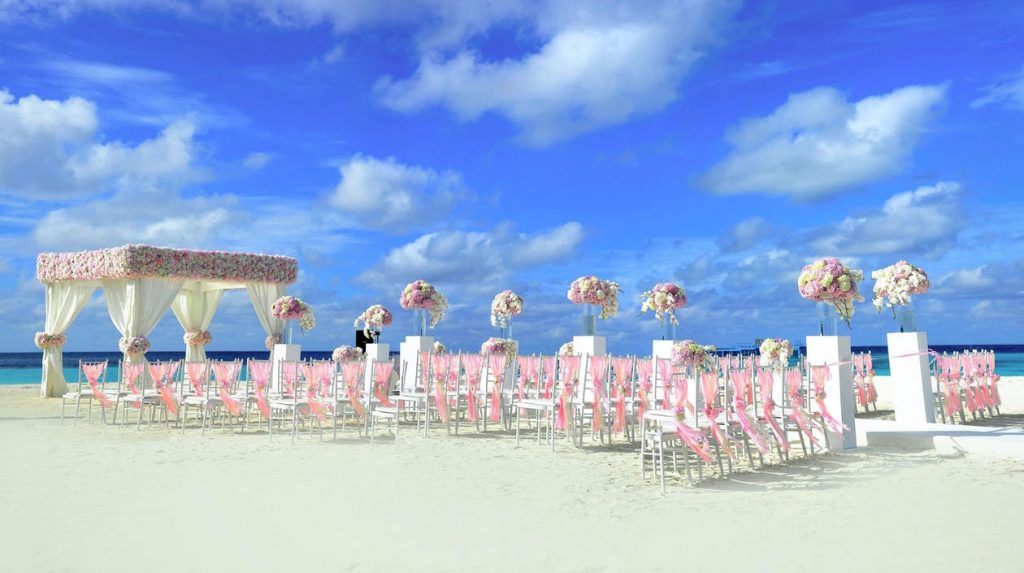
You may also like to read:
- Themes and Ideas for a Dreamy Vintage Wedding
- Magnificent Wedding Aisle Decorations for Your Incredible Wedding Day
One of the many reasons why beach weddings are enticing is that they are held outdoors, in a picturesque coastal environment, while the waves and the breeze chant their accolades over your marriage with your better half. They differ greatly from a formal ceremony, which is sometimes held in a chapel or other costly indoor venue. This is not to imply that there aren’t any other desirable outdoor wedding styles, such as garden wedding receptions, but beach weddings are unquestionably a different realm.
Although a few beach ceremonies might be grandiose, the allure of a small beach wedding is mostly that it enables you to plan your big day with design simplicity. For a beach wedding, you can decide how stylish to be and what aspects of a formal wedding ceremony you would like to keep or add, and you’ll also have plenty of freedom to experiment with beach and seafront concepts.
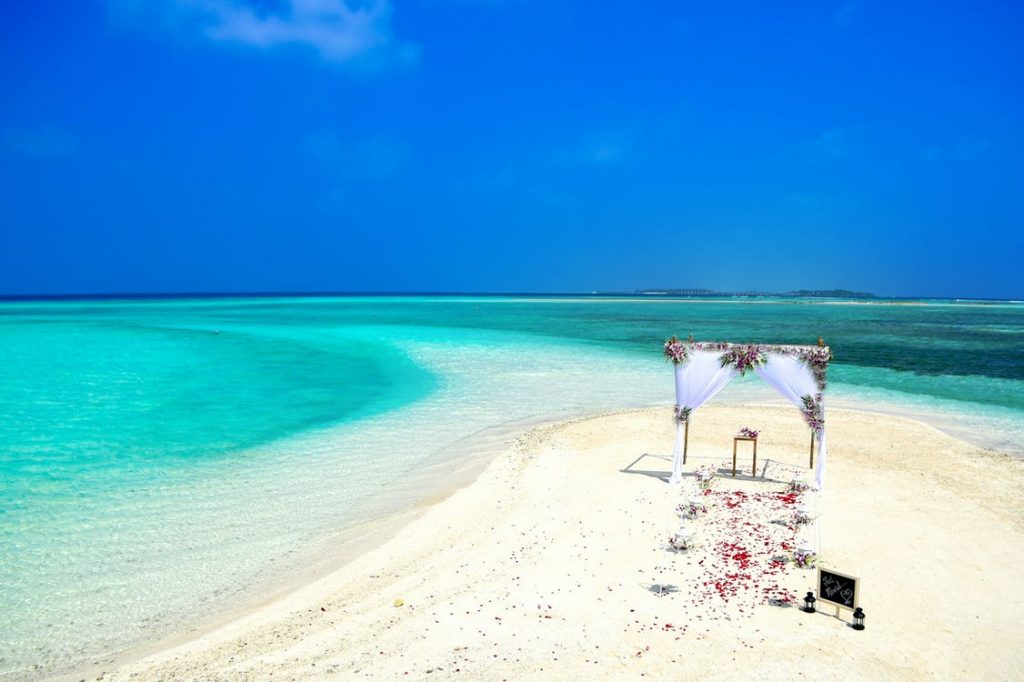
Here we have curated a special list for you if you are looking for a starting guide to plan your perfect beach day wedding. Let’s get into it, shall we?
Save the Dates
Provide your guests with advance notice of your big wedding date if your beachfront wedding is also a destination wedding, so they have time to seek holiday leave at work and locate affordable travel options. Save-the-dates should be sent out some months before the big day, but a year in advance would also be in the best interest of the party, particularly for VIP guests like families and ceremony members.
Choosing Location
There are beach locations all over the globe, and each of them is stunning in its unique way. For example, the ecstatic as ever Sydney harbour and the nearby beach destinations and the amazing views they offer. Consider going back to the location of a significant holiday; choosing a location with sentimental value to your relatives or where your family resides when choosing your wedding venue, or even picking a location with affordable budget airlines from the majority of your attendees’ home countries.
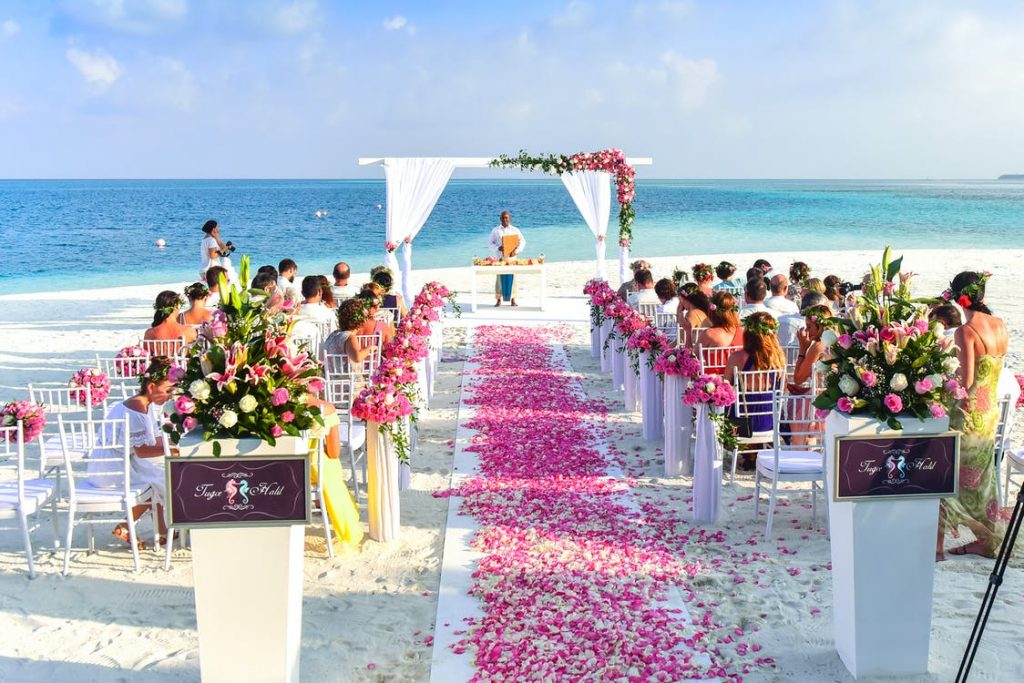
Check the Weather Conditions
When does the storm season begin? Will there be a drought and a rainy season? When is the ideal time to spend more than 10 minutes outside without getting uncomfortable? When choosing the ideal season for your beach wedding, you should consider all of these inquiries.
Although the reduced rates during storm season may be alluring, be aware that you are taking a major risk. You will not be able to just bring items indoors if a hurricane strikes—and with climate change, they’re approaching more frequently and larger than before. Both you and your attendees will be required to postpone their travel plans in addition to having to reschedule the entire ceremony.
The monsoon season may not be as problematic as you expect, so be cautious and find out the precautions. Near the ocean sides, it will presumably rain for a minimum of a few minutes. Rainfall won’t ruin a special occasion, though, if you make preparations like renting a canopy for the banquet and being adaptable to the schedule of an outside celebration.
Essential Permits
Check your local municipality’s rules before trying to set up an arbour and seats, since permission might be needed for a larger event, unless the beach venue is on privately owned land. If you’re tying the knot in a public place, such as a public beach, a state park, or even your neighbourhood venue, you’ll need to put in a little additional effort to ensure that your wedding venue is legally valid.
Conventional venues may take care of the paperwork for you. Whether you’re having a party on a private beach, you may still be required to investigate and abide by any applicable city regulations. Take some time and browse through the web to check if the local government of the location lists any legal requirements as a first step. If something is a little confusing, ask your wedding planner for guidance and perhaps even visit the municipality office to find out more.
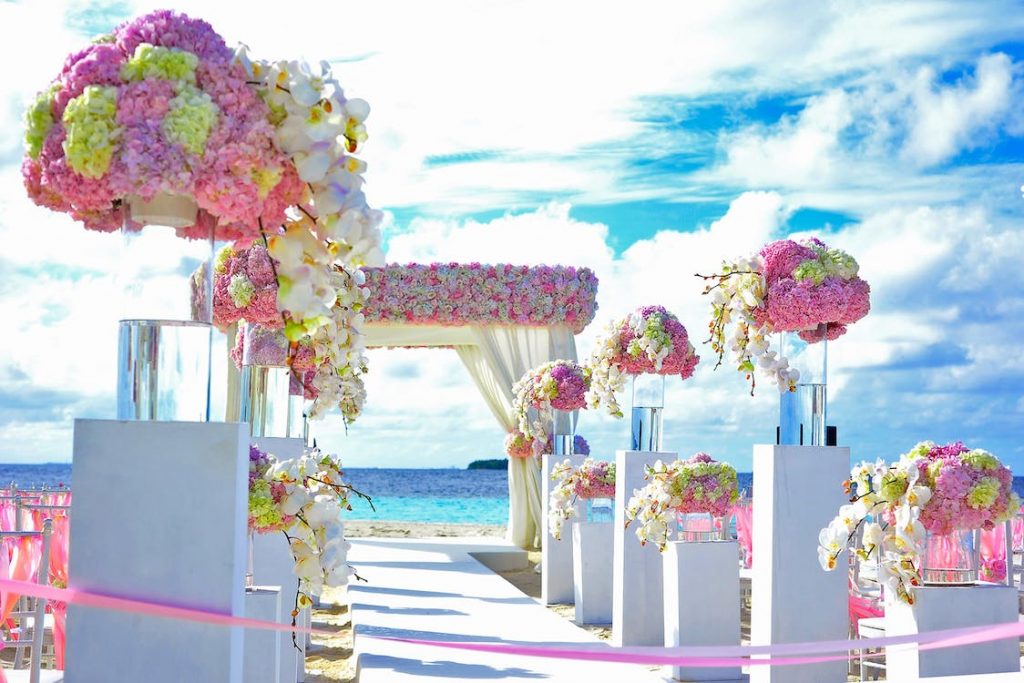
Make Smart Arrangements
Cushioned or hardwood seats are much simpler to assemble and disassemble than cushioned ones and may be simply cleaned in the event of unexpected rain. If you’re going to get married on the sandy shore, a location for guests to deposit their footwear, also known as a shoe valet, is a fun décor feature and an attractive feature to provide. Due to the ocean breezes, objects shouldn’t be put directly on seats without anything holding them down.
You should also be careful about what loudspeakers you choose. You should certainly consider spending money on this if sound enhancement is permitted and your gathering is more than 50. Your speech won’t carry as far in an open area as it would in a hall. It is the same with musical arrangements if there are live instruments or a vocalist. A poor audio system could pick up far too much wind and background noise, so be certain to speak with an expert.
Shades and Booths for Guests
Always consider the fact that guests will be exposed to the outdoors while attending an outdoor event. If it’s a monsoon, there will be wet grounds, and if it’s the summer season, the heat. So make sure to include little booths and shades for the guests so that they won’t be exhausted by the weather conditions.
By holding your wedding in the mornings or late evenings when the heat is mild, you can keep everybody comfortable and cool, particularly in warmer areas. Additionally, you should consider shadowing, particularly for the benefit of the elderly and young children. It’s wise to keep an eye on the weather conditions while having a beach or outdoor ceremony, so you understand what to prepare for. To keep people cool, wooden poles can be wrapped with light, white cloth, or you can find a canopy to shade the dining area.
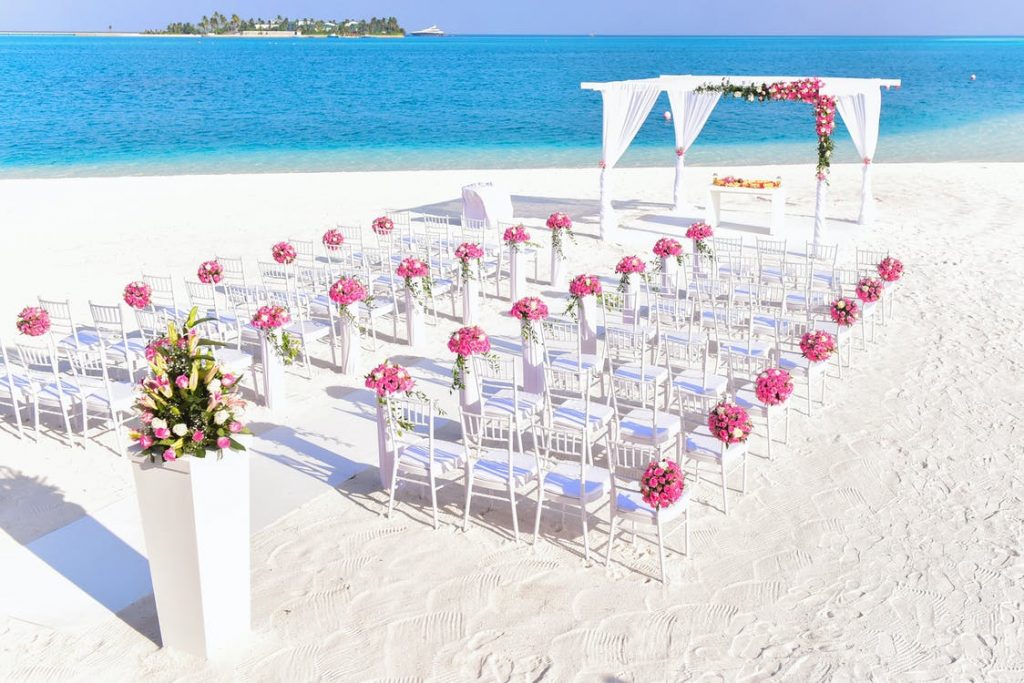
Add Local Delicacies to the Cuisine
While most of the food and beverages at your wedding should reflect your preferences, it’s also a great idea to explore the local cuisine and add special elements throughout the wedding and reception. Everyone can have a more genuine experience. The guests at your wedding will prefer a unique cuisine choice which is different from the traditional meals served at weddings.
Beach Wedding Dress Code
Although most receptions have a more laid-back and simple approach, this does not mean that yours must be as well. So if you want you and your guests to stand out at the wedding, suggest a dressing team to the people who are attending, and the best way to do that will be to include the theme in the invite card itself. However, you should consider guest convenience; requesting that male attendees wear traditional tuxedos may be a little much if most of the event takes place outside.
From the start, make it clear to your guests whether the celebration—or any other part of the ceremony—will take place on the beach side. If guests travel to a huge hotel, they may not think the marriage will be on the beach. Encourage your guests to bring sunglasses and goggles, use sunblock, and wear heels at a height that they won’t find difficult to walk on the sandy beach. You can give messages on your wedding invitation and include a printed card with the information in your wedding welcome goodies bag.
Avoid Unnecessary Crowds
One of the things you must try to learn in advance is when the beach side is most crowded. Avoid this particularly crowded time to ensure you have adequate privacy and to prevent your marriage from turning into a frenzy. Beaches are typically quieter during the weekdays and on non-holiday weekends. For instance, function setup is not permitted on some popular beaches on a few beach sides near Sydney. In cases like this, you should opt to rent a beachfront property so that you can continue to shoot pictures on the sand after your wedding.

Utilise the Natural Beach Vibes
You won’t have to go overboard on the decoration front because the beach is already a stunning decoration by itself. Rather, concentrate on enhancing the surrounding environment in a manner that will help make your marriage memorable. You can use the varied shades of the water or sand to create a theme and incorporate items like pebbles, dune glasses, and pastel floral arrangements. It doesn’t just have to be just seashells and ferns.
A Backup Plan
There’s a decent possibility that some events might not go as anticipated on your wedding day, regardless of how much effort you put into creating Plan A. Set out a Plan B and even a backup Plan C with your event planner in advance to ensure all things go according to plan in case bad weather prevents a beachfront marriage ceremony. It’s crucial to communicate these specifics to your officiant, wedding coordinator, and all other wedding suppliers, in addition to family members and loved ones who are participating in the preparation phase.
It’s essential to test out any audio and video systems before the event to have time to resolve any difficulties that may develop and have a backup plan. Test your microphones, speakers, and generator the day before the wedding. Some wireless systems don’t have a strong signal on the shore and might face synchronization issues. Even fairly simple things like depending on wireless systems seem immune to failure, so it is best to be aware of potential problems a day or two in advance to give yourself time to make necessary changes.


